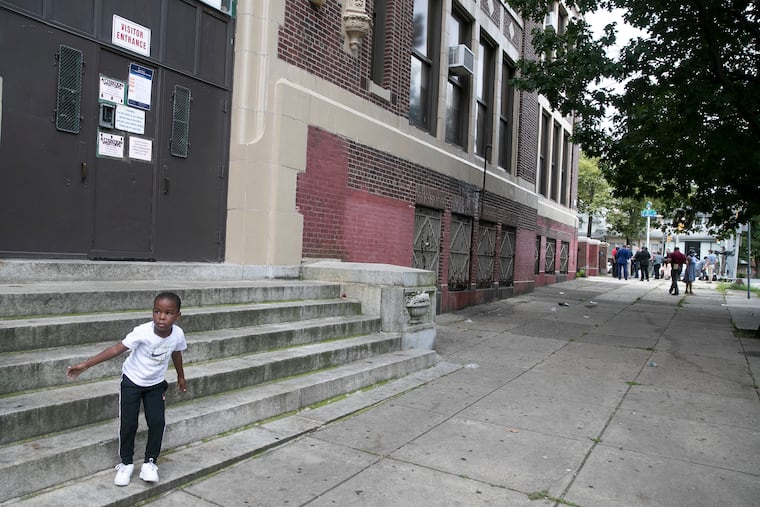Philly’s school district is halting reopenings. It should’ve listened to teachers earlier. | Opinion
Educators have been asked to take on even more roles and responsibilities with little adjustment in support, training, or compensation.

The Philadelphia School District announced Tuesday it would halt its plan to start reopening classrooms Nov. 30. The Board of Education approved the plan on July 30, in a vote that had been postponed after an eight-hour board meeting the week before. But tensions between the board and its educators have been building since schools closed suddenly in March. Without better efforts from the board and district, those tensions will continue.
Educators have expressed their concerns about reopening school buildings in a plurality-Black school district that has lacked adequate funding for decades. This confluence of race, class, and health exacerbates concerns around who is making decisions about the district’s plan and who will actually suffer the consequences of those decisions. During this pause in reopening, the district must address outstanding safety concerns that have long been ignored by leadership that has not clearly communicated with its constituents in the past. It needs to prioritize decision-making informed by the experiences of those who spend the most time in school facilities and classrooms.
» READ MORE: Philly schools to remain fully virtual until further notice
The July 23 meeting, at which more than 150 students, educators, and community members registered to virtually speak, drew a swift and largely unified community response to the reopening plan: The district could not reopen schools safely given the existing conditions of school facilities (including ventilation systems), the high socioeconomic needs of students, and the significant personnel needs in hybrid education models, such as more paraprofessional, technical, health, and custodial support to maintain separate cohorts. While no one can deny the limitations of online learning, the district’s (and board’s) desire to rush back to classrooms has further eroded the trust of one of its key stakeholders: Philadelphia’s public school educators.
At risk here is the long-term health of students, educators, caregivers, and their households and communities. Philadelphia’s long legacy of segregation has ensured that the least white, least affluent, and least healthy populations are in close proximity, and these communities are the majority of the school district’s student population. While children have lower risk of fatal outcomes from COVID-19 complications, more than 75% of all child deaths have been Black and Latinx.
These racially disparate fatalities are consistent across age groups, suggesting that entire households must grapple with the risks from the decision to send children back into the classroom. For Black and Latinx households, these risks are weighed against rising unemployment rates since the pandemic began.
The original — and yet to be adjusted in public — reopening plan was meant to bring students into schools on an alternating schedule, prioritizing elementary students and students with disabilities. One cohort would attend Monday and Wednesday for one week, then Tuesday and Thursday the following week. When not in a school building, they could learn virtually at home, engaging with their in-person and virtual classmates and their educators in the classroom. Classrooms would follow distancing protocols, everyone would wear PPE, and the district would prioritize cleaning and repairing ventilation systems to consistently circulate clean air.
» READ MORE: In-person teaching puts my family at risk, but the Philly School District leaves me few options | Opinion
Although the safety realities of COVID require fewer people in classrooms at once, there was no effort to hire more educators or to restore and remediate unusable classrooms. Somehow, the plan asks educators to teach in multiple classrooms (in-person and virtual), prepare multiple lesson plans, act as a public health monitor, and run interference on any technology issues that could emerge. In essence, the educator was asked to take on even more roles and responsibilities with little adjustment in support, training, or compensation.
Philadelphia educators have sacrificed a great deal in the last decade. Between state control, the foreclosure crisis, and the constant disruptions from school closures (both due to facility conditions and district decision-making), Philadelphia educators are consistently adjusting to district, state, and federal policies and budget cuts that assume these changes have no impact on the classroom experience. We must bring them into decision-making processes early and often to maximize the limited resources at the district’s disposal, in ways that reflect the realities of our students and communities.
Our school leaders must think and act as a community, seeking the greatest long-term outcomes for the largest group — here, our majority nonwhite, non-affluent students, those who educate and support them in facilities, and the households and communities where they live. COVID has also produced an opportunity for new governance structures: bringing together experts in public health, race, education, and transportation to produce policies grounded in local knowledge. City leaders, school district officials, and the Board of Education must come together to address the concerns of educators by including them in school governance.
» READ MORE: What’s best for Philly schools this year? Educators weigh in. | Opinion
For now, that means greater responsiveness, inclusion, and transparency around data collection relating to the needs of educators, students, and families — such as the data showing that less than a third of eligible Philly students' families even wanted them to return to school.
Let’s keep listening to educators, students, and households that want greater say in school policies and decision-making. Please support our educators in their quest for safer, equitable school governance during COVID and beyond.
Akira Drake Rodriguez is an assistant professor at the University of Pennsylvania’s Weitzman School of Design in the department of city & regional planning. Erika Kitzmiller is a term assistant professor at Barnard College and former public schoolteacher.